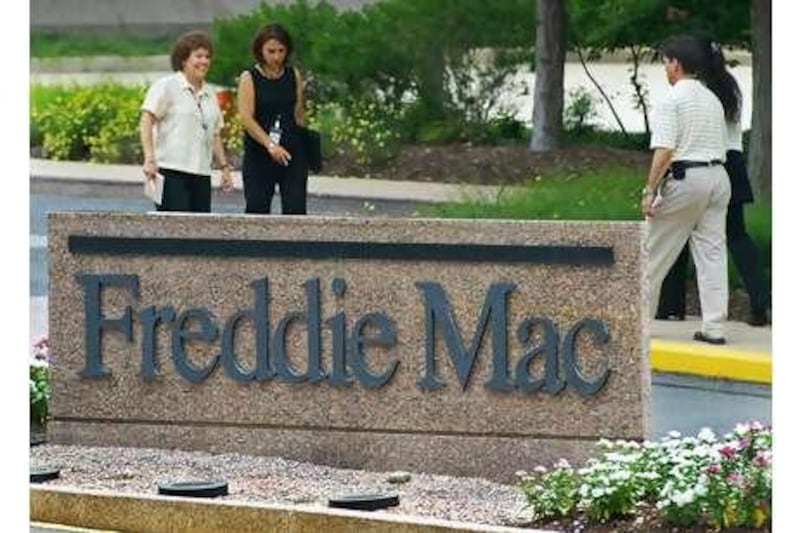Fannie Mae and Freddie Mac. They sound like a minstrel act, all burlesque shuffle and black face, and as financial institutions in an allegedly market-driven economy, they are just as anachronistic. But the collapse of America's state-backed mortgage lenders is an American political tragedy, all the more so because no good is likely to come of it. Last week, Henry Paulson, the treasury secretary, stood in front of the Treasury building and announced that the US government would, if necessary, guarantee the technically insolvent mortgage companies' US$5 trillion (Dh18tn) in home loans. Thus, two inept bureaucracies completed their journeys from de jure to de facto wards of the state.
The move also advanced a power grab by the federal government not dreamed of since Richard Nixon settled into his second term as president. In March, after bailing out the investment bank, Bear Stearns, while extending emergency credit lines to its rivals, the Treasury and Federal Reserve added market stabilisation to their mandate alongside their traditional roles as price setters. Now, Washington has extended that new responsibility to include government-chartered agencies like Fannie and Freddie, which account for nearly half of the US mortgage market.
Economists, most of whom agree that the nation's twin mortgage giants should have been broken up years ago, reluctantly supported Mr Paulson's plan as an unavoidable response to a severe liquidity crisis. They also expressed concerns that it could evolve in the same self-aggrandising way as did the Monroe Doctrine, Washington's 19th-century manifesto that declared the continental US off limits to foreign colonisers, only to use it as a legal basis for invading Mexico.
Investors seemed equally wary, dumping not only Fannie and Freddie shares, but also stock in commercial banks. Credit protection rates - a once obscure Wall Street indicator that has emerged into a closely watched indicator - rose last week for deposit-taking institutions as well as big investment banks, following the collapse of a small commercial lender in California. In plotting their investment strategies, some wealthy individuals are Balkanising their savings into separate deposits of no more than $100,000 - the maximum amount the government will insure against bank failure.
Ben Bernanke, the Fed chairman, spent much of last week grappling with his new mandate, cobbling together the Fannie and Freddie bailout, investigating ways to improve consumer protection rules for mortgage lenders and testifying to congress on everything from oil markets to credit card regulation. Mr Bernanke, once a disciplined monetarist, was wasting no time converting to Keynesianism. For those concerned about the sustainability of the world's largest capitalist economy, this is serious stuff. By widening its regulatory net for the sake of massive bailouts, Messrs Paulson and Bernanke set a dangerous precedent, and toward what end? When asked during a congressional hearing whether senior officials at Fannie and Freddie would be held to account, Mr Paulson said he was "not looking for scapegoats". Fine. But what about officials guilty of incompetence, corruption, or both?
Mr Paulson's reply was interpreted by some on the Beltway as a signal that the historically troubled mortgage companies would once again get a free pass. For years, America's financial mandarins have warned of Fannie and Freddie preponderance. Alan Greenspan and John Snow, predecessors to Mr Bernanke and Mr Paulson respectively, frequently told lawmakers that the two agencies could swamp the US economy if they did not undergo an aggressive overhaul. (Mr Greenspan did, however, praise their pioneering of the mortgage-backed security, which fuelled the country's housing bubble.) In 2004, a federal oversight commission slammed Fannie Mae for inaccurate accounting standards and mismanagement. Last May, Franklin Raines, the Fannie Mae chief executive, stepped down amid an accounting oversight estimated at $6.3 billion. Raines was making $20 million a year at the time.
So what's keeping Fannie and Freddie afloat? In a word, patronage. The revolving kitty at the heart of Victorian-era machine politics has, at least in this case, been modernised and made bipartisan for a more refined generation of political suites. Democrats love the two agencies for making home ownership a reality for low-income families, Republicans for the business and subsidies they generate.
Since taking control of congress, Democratic leaders have resisted Republican calls to reform Fannie and Freddie. Investment bankers at firms like Goldman Sachs, which Mr Paulson chaired before moving to the Treasury, are no doubt relishing the prospect of scooping up distressed Fannie and Freddie assets. Everyone has a stake in keeping America's mortgage Leviathan intact. Everyone, that is, expect for taxpayers who will get stiffed with the bill.
@Email:sglain@thenational.ae





